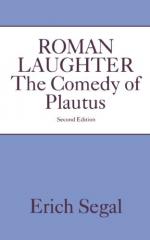|
This section contains 10,327 words (approx. 35 pages at 300 words per page) |

|
SOURCE: William M. Owens, "The Third Deception in Bacchides" in American Journal of Philology, Vol. 115, Fall, 1994, pp. 381–407.
In the following essay, Owens compares Plautus's Bacchides to the Greek play on which it was based (Menander's Dis Exapaton) and demonstrates that several aspects of the play's plot and themes are Plautine in origin.
Chrysalus is one of Plautus' most clever slaves. In the course of Bacchides he deceives his master three times. But the model for Bacchides was Menander's Dis Exapaton, "The Man Deceiving Twice," whose title implies only two deceptions. This difference in arithmetic was the seed of a scholarly controversy which germinated in 1912 with the publication of Eduard Fraenkel's dissertation, De Media et Nova Comoedia Quaestiones Selectae. Fraenkel suggested that Plautus added the final deception in Bacchides through the process of contaminatio, using another, unidentified Attic comedy for his model. The response to this hypothesis was mixed...
|
This section contains 10,327 words (approx. 35 pages at 300 words per page) |

|


